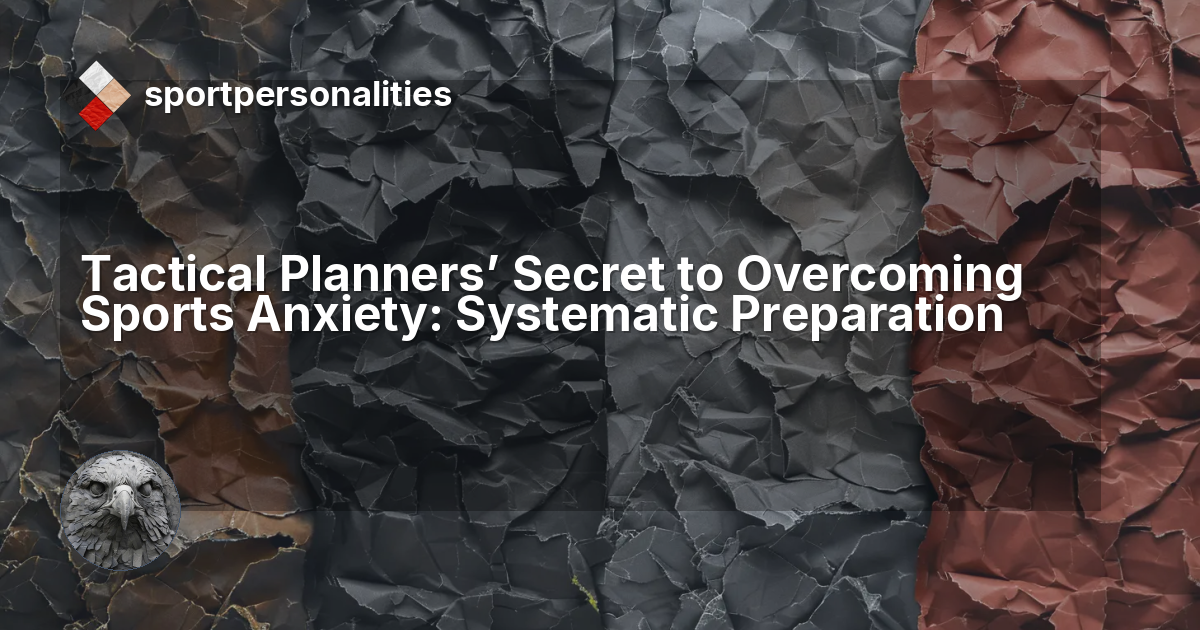The Myth: Controlling Every Variable Eliminates Anxiety
The conventional wisdom sounds bulletproof: prepare thoroughly, anticipate every scenario, eliminate uncertainty, and anxiety disappears. For Record-Breaker athletes, those combining strategic thinking with a  Drive for measurable achievement, this advice seems perfectly tailored. Their analytical minds excel at mapping contingencies. Their planning skills can break down competitions into manageable components.
Drive for measurable achievement, this advice seems perfectly tailored. Their analytical minds excel at mapping contingencies. Their planning skills can break down competitions into manageable components.
Yet many Record-Breakers discover a frustrating paradox. The more variables they control, the more anxious they become. Their pre-competition routines expand from 30 minutes to three hours. Their strategic notebooks multiply. Their mental rehearsals grow increasingly elaborate. And the anxiety? It intensifies rather than dissolves.
This happens because the conventional approach misunderstands how anxiety actually works for athletes with analytical cognitive approaches combined with extrinsic motivation. They're treating anxiety like a puzzle with a solution when it functions more like a feedback loop that preparation can inadvertently amplify.
The Reality for Record-Breaker Athletes
Athletes with analytical cognitive approaches process information through systematic frameworks rather than instinctive reactions. They naturally break complex challenges into component parts, identify patterns, and create strategic responses. This strength becomes a vulnerability when applied to anxiety itself.
When Record-Breakers experience pre-competition nervousness, their analytical mind immediately begins problem-solving. What caused this feeling? Which variables remain uncontrolled? What additional preparation would eliminate this discomfort? This triggers an ironic process: the attempt to analyze and control anxiety creates more material to analyze and control (reference suggested).
Their extrinsic motivation, the drive for external validation and measurable achievement, adds another layer. Anxiety itself becomes evidence of inadequate preparation, a problem demanding solution before the "real" performance can begin. They pursue the perfect mental state like they pursue personal records: through systematic optimization. But mental states resist the same control strategies that work for physical skills.
Why the Myth is Backwards
The control-based approach to anxiety assumes nervousness stems from insufficient preparation. But for athletes combining analytical cognitive approaches with self-referenced competitive styles, anxiety often emerges from the opposite source: over-preparation creating impossible standards.
Their self-referenced  Competitive Style means they measure success against internal benchmarks, previous performances, projected capabilities, strategic ideals. Unlike opponent-focused athletes who can externalize pressure onto the competition itself, Record-Breakers carry their standards internally. Every additional scenario they prepare for becomes another potential failure point to monitor.
Competitive Style means they measure success against internal benchmarks, previous performances, projected capabilities, strategic ideals. Unlike opponent-focused athletes who can externalize pressure onto the competition itself, Record-Breakers carry their standards internally. Every additional scenario they prepare for becomes another potential failure point to monitor.
Consider a Record-Breaker preparing for a competition. They analyze previous performances, identifying three technical adjustments. Their analytical approach breaks each adjustment into component skills. Their strategic mind maps how different conditions might require tactical variations. Their desire for measurable achievement establishes specific performance targets.
This preparation is valuable. But when anxiety appears, their response creates a secondary problem. They analyze the anxiety itself, creating contingency plans for nervousness, building additional mental protocols, expanding their preparation scope. The original three adjustments become twelve variables to monitor, each requiring real-time assessment during competition.
The Better Framework
Effective anxiety management for Record-Breakers doesn't eliminate preparation, it redirects it. Instead of using systematic thinking to control anxiety, they channel that analytical strength toward understanding anxiety's actual function: physiological readiness signaling, not performance prediction.
Athletes with autonomous social styles, preferring self-directed training and independent execution, already possess the mental independence to reframe anxiety without requiring external validation. They can recognize nervousness as data rather than verdict, information about activation level rather than competence assessment.
The framework shift involves three recognitions. First, anxiety and excitement share identical physiological signatures, elevated heart rate, heightened alertness, increased energy. The interpretation determines the impact (reference suggested). Second, some nervousness indicates appropriate engagement, not inadequate preparation. Third, the goal isn't eliminating anxiety but establishing functional relationships with arousal states.
Record-Breakers excel at systematic approaches. The solution isn't abandoning structure but redirecting it toward anxiety acceptance protocols rather than anxiety elimination strategies.
The Preparation That Actually Works
Effective preparation acknowledges that competition includes uncertainty, and competence means performing effectively despite imperfect conditions, not achieving perfect conditions before performing. This distinction transforms everything.
Instead of creating contingencies for every possible scenario, Record-Breakers develop general principles that guide adaptive responses. Instead of attempting to achieve the perfect mental state pre-competition, they practice performing effectively across various arousal levels. Instead of treating anxiety as a problem requiring solution, they incorporate nervousness into their strategic framework as expected competition data.
Strategic Reframe Protocol
Identify three previous competitions where nervousness preceded strong performances. Document the anxiety level, the performance outcome, and the relationship between the two. This creates evidence that nervousness doesn't predict failure, it accompanies meaningful engagement.
Limited-Variable System
Establish a maximum of three tactical focuses for any single competition. When the analytical mind generates additional concerns, acknowledge them but defer detailed analysis until post-competition review. This prevents real-time preparation expansion.
Arousal-State Training
Practice core skills under varying nervousness levels, from completely calm through moderately anxious. This builds confidence that technical execution remains accessible across arousal states, reducing the perceived need for perfect mental conditions.
Discover Your Sport Personality
This article explores one of 16 profiles. Find out which one you are and unlock a personalized blueprint for your athletic journey.
Take the Free TestRewriting Your Approach
Record-Breakers transitioning from control-based to acceptance-based anxiety management often experience initial discomfort. Their analytical cognitive approach seeks logical certainty. Their extrinsic motivation wants measurable progress markers. Accepting anxiety without attempting to fix it feels counterintuitive, like deliberately leaving preparation incomplete.
The reframe requires recognizing that anxiety management isn't an additional preparation category, it's integrated into competition itself. Just as they don't expect perfect environmental conditions or flawless opponent behavior, they extend that acceptance to their own physiological states.
Athletes combining analytical approaches with self-referenced competitive styles possess a distinct advantage here. They're already accustomed to evaluating performance against internal standards rather than external validation. This internal reference point allows them to define "successful anxiety management" not as the absence of nervousness but as effective performance despite its presence.
The strategic approach that serves Record-Breakers so well in competition preparation applies equally to anxiety navigation, but the strategy shifts from elimination to integration. They map their typical pre-competition arousal pattern just as they analyze opponent tendencies. They identify which performance elements remain stable under nervousness and which require adaptation. They develop simple activation management techniques rather than elaborate mental state control systems.
This isn't abandoning their analytical strength. It's directing that systematic thinking toward functional frameworks rather than impossible standards. The result: preparation that genuinely reduces anxiety by accepting its presence rather than intensifying it through futile control attempts.
Record-Breakers don't need less preparation. They need preparation redirected from comprehensive control toward strategic acceptance, the same mindset shift that separates good tactical planning from brilliant strategic execution.
This content is for educational purposes, drawing on sport psychology research and professional experience. I hold an M.A. in Social Psychology, an ISSA Elite Trainer and Nutrition certification, and completed professional training in Sport Psychology for Athlete Development through the Barcelona Innovation Hub. I am not a licensed clinical psychologist or medical doctor. Individual results may vary. For clinical or medical concerns, please consult a licensed healthcare professional.


